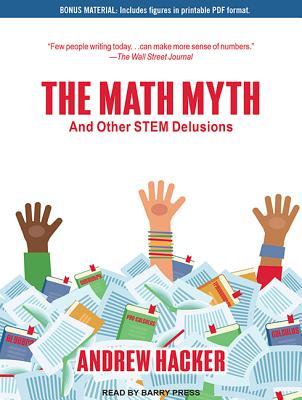What do you think?
Rate this book


Audio CD
First published May 5, 2015
'Of course mathematics' teachers and professors have to claim that what they do sharpens your thinking skills and makes you generally a better thinker. There is no evidence at all that people who have done a full menu of mathematics are any more thoughtful than the rest of us. I looked around for research to show that people trained in mathematics are smarter, more logical and couldn't find any. So I did a study of my own: at my college, every student takes a math test in order to get in. So, I took an incoming freshman who opted to take an introductory course in History. Then what I did was I lined up their math scores and their grades in the History course. Guess what? Zero correlation. Some people who did well in Math did well in History, and some who did well in Math bombed in History.'Great study, bro, very legit. On top of trying to pass this hilariously bad methodology as valid reasoning, Mr. Hacker also claims STEM education is one big conspiracy and the professors are behind it.